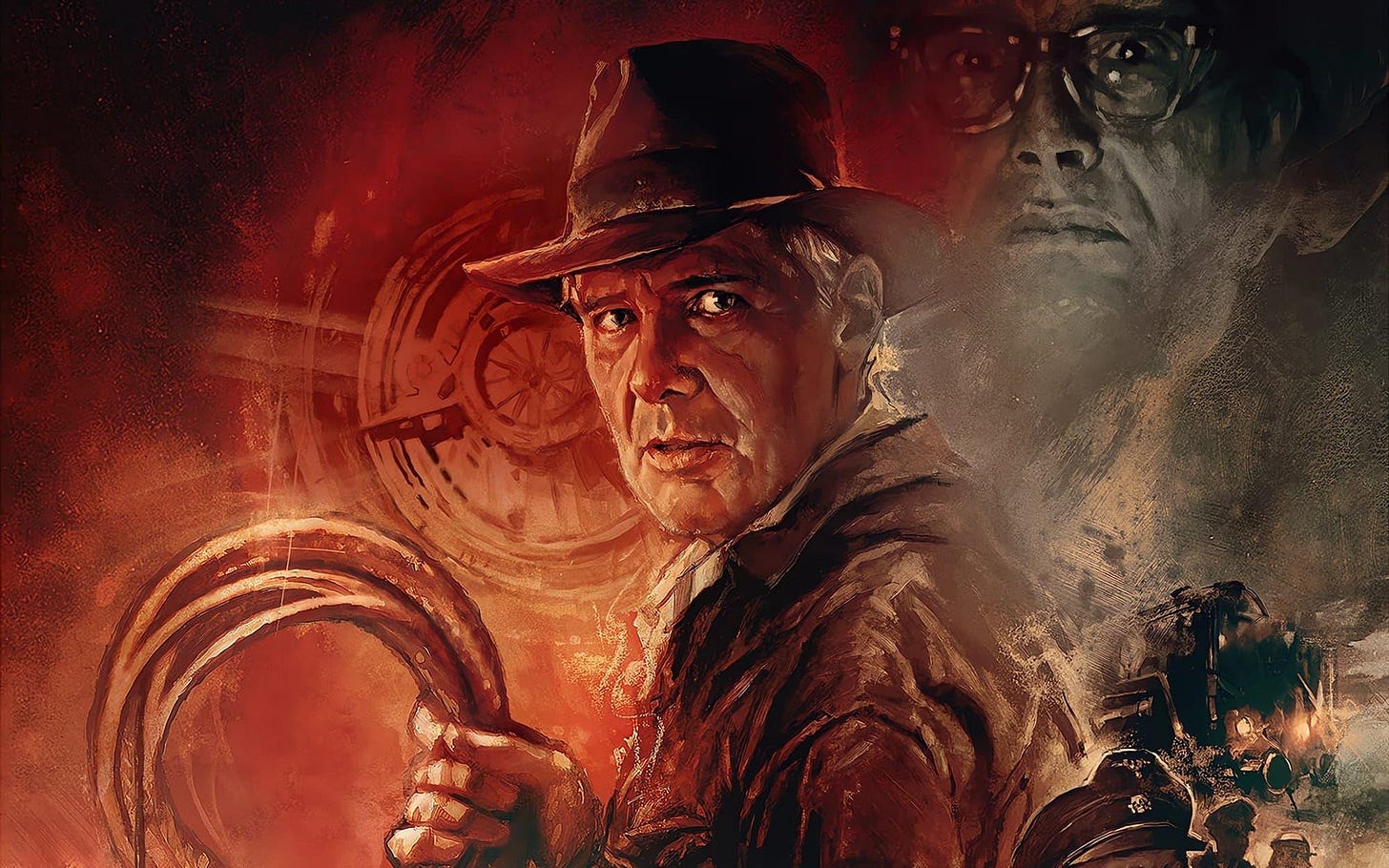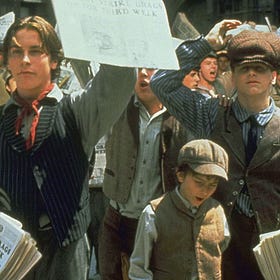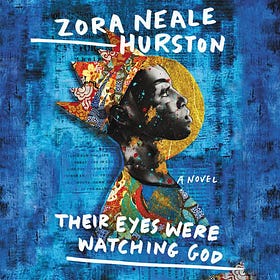Your Story Doesn't Have to Be Perfect
But it DOES have to be poignant
(Psst…scroll all the way down for your early release of our next podcast episode! 🙃)
If Adventure Has a Name . . .
Even before I saw any of his films, I always knew the adventurer Indiana Jones and I were destined to be friends. As a child (particularly thanks to my father) I can’t remember not knowing about the character. So, when I finally rented Raiders of the Lost Ark from Blockbuster as a pre-teen, the experience was a revelation. I was transported into that film in a way few pictures can do. I had a dinner of hamburger and onion rings, and I know so because Indy’s story was so rapturous I ignored my food and my meal went cold. Getting hungry, I paused the movie and got up to warm up my dinner, urgently begging the toaster oven to work faster so I could get back to the Egyptian deserts and the search for the Ark of the Covenant.
To this day, whenever I re-watch Raiders, I still feel the uncanny magic I did that evening, and that is nothing short of a miracle. Perfection, one could say.
When the film ended, I was never quite the same in all the best of ways. Soon, I devoured the rest of the trilogy: Indiana Jones and the Temple of Doom and Indiana Jones and the Last Crusade, then re-watched them again and again. I have long been an adoring fan of the series. Thus, at the height of the dark days of the Recession, my father, younger brother, and I went to the movie theater to see the highly-anticipated return of the great adventure hero in Indiana Jones and the Kingdom of the Crystal Skull. For various reasons, the picture was a disappointment, and, for me, time has not been kind to that film.
The trouble was that–while Indy finally got to be with his true love from Raiders, Marion Ravenwood (one of my cinema crushes)–the movie did not accomplish anything for me. Now, my re-watches of the series ended on a twisted ankle rather than the stuck landing that is Last Crusade. Crystal Skull grew into this odd thorn in my side for this beloved series–like something else needed to be and should be said about the titular character. He deserved a better ending.
So, when Indiana Jones and the Dial of Destiny was officially announced after a decade of development, with James Mangold–a director I respect very much–at the picture’s helm, I was excited. The trailers made the film look like so much dang fun. The stars seemed to align, and I was going to get the ending to this tale that Crystal Skull didn’t give me. Dial of Destiny was one of my most anticipated films for 2023, and so I got tickets to the very first showing for the Thursday previews. The film began, the titles came up, and I shook my brother’s arm next to me like a little kid.
(Fair warning: I will be divulging into spoilers for the remainder of this article).
The Disappointment.
When the film ended, I walked out of the theater and literally said, “Eh.”
To be fair, I actually was suffering from a small anxiety attack that day, so my mind was distracted and muddled. The theater I saw the picture in, which I lovingly nickname The Last Dive Theater, had the most uncomfortable chairs in the whole frigging world. Seriously: my neck was killing me because this ugly seat was determined to fix my posture for 3 hours (combining the film’s extensive runtime and those bloody 30-minutes worth of meaningless trailers). So, my headspace was not proper for the film to begin with.
But regardless of my discomfort, I was not particularly pleased with Dial of Destiny.
The 20-minute prologue was boring, could have been removed without affecting the story, and had too much unconvincing CGI, which no great adventure should suffer from. The wretched AI de-aging of the elderly star Harrison Ford’s face yet not his voice felt more like a heinous tech-demo from the evil Disney corporation than an artistic experiment. The dull villain, played by the excellent Mads Mikkelsen, got smacked by a bar atop a high-speed train, then 30 years later in the story was totally fine! I swear, I thought he was going to reveal a torn-up face later, but nope! He was totally unscarred, which even by adventure serial standards was bizarre.
Plot threads picked up from Crystal Skull made little sense or needlessly presented first as mysteries. The villain's plot of going back in time to win World War II for the Nazis felt generic. The promoted conversation about Indy being in the space age amounted to little more than aesthetics. All the technical talk about this titular, time-travelling Dial and the bad guys’ association with the FBI was muddled and confusing.
I tried discovering what exactly the film was trying to do and why, while looking for the fun of the picture. Sure, Indy’s goddaughter and companion, Helena Shaw, played perfectly by Phoebe Waller-Bridge, was fantastic, but all the other characters were flat and forgettable. All the action scenes were uninspired, or poor imitations from spectacular scenes in Uncharted, the adventure video game series I adore. I never thought I would say so about an Indiana Jones film.
The locales felt lifeless with annoying CGI extensions and uninteresting visual flairs; without that rich reality present in the original trilogy. The overly-long plot meandered on. There was just no sense of dramatic or thematic propulsion. It was like the piece could not balance the drama the filmmakers wanted nor the pure adventure it was meant to have. The film’s creepy crawlies–a tradition of the series–were eels. A great choice…until they did nothing of consequence.
In the theater, I just wanted the film to either wrap up or come to a major point I could understand; or at least give me a breathtaking visual I could escape into. Two and half hours of such storytelling was not cheering me up. After more globe-trotting and more mediocre adventure, eventually Dial of Destiny did reach its climax.
I enjoyed the twist ending: that the Dial of Archimedes does not bring the Nazi villains back in time to when they wanted, but only to the Battle of Syracuse in 213-212 B.C., where its inventor resided. Indy’s choice to stay and die in the past, driven by his very real grief from the loss of his son from Crystal Skull, being stopped by a much-needed punch to the face from Helena was brilliant. His and Marion’s reunion in their present day was touching, and the sense that healing could begin was lovely. Plus, that ending shot was perfect.
But when the credits rolled and John Williams’ iconic “Raiders March” theme began, I just felt let down. Nothing in the picture (costing an unparalleled budget of $250-$300 million, which I still cannot comprehend) offended me at all, but nothing great stuck with me. I was promised and hoped for so much more. I liked what Dial of Destiny was trying to say, but felt the picture needed to be different for the point to come across. More daring, innovative, or glorious, akin to James Mangold’s magnificent picture, Logan. I expected better. Instead, another Indiana Jones film disappointed me, and this time there would never be another one.
Later, in 2025 . . .
So, Dial of Destiny became another thorn in my side. In my mind, the adventure genre in live-action cinema was pretty much dead, Mangold’s stardom had dimmed a bit, and Indy’s story remained emotionally incomplete. The film bombed, received mixed reviews, and I could not disagree with those who said it was average at best. Despite my noted discomfort during my screening, I knew my criticisms were fair. I even made a video experimenting with how the film could have opened without that unaffecting prologue just to get the disappointment out of my system. For a year and a half, my brother and I bemoaned how the film could have been better and wondered what went wrong.
Finally, in January 2025, I decided I needed to give the film another chance with a first re-watch. This time I saw the film with my father, who had not yet seen the piece. I prepared myself for a long, unpleasant two-and-a-half hours, knowing revisiting the film would not erase my disappointment.
In Retrospect.
Turns out, I was right. The filmmaking remains relatively unremarkable and my critiques on this flawed film are still valid.
However.
As the film ended, my father, who had been prepared for disappointment by me and my brother, summed up my altered feelings by saying happily: “That was pretty good. It wasn’t great, but it was pretty good!”
I myself realized I felt different about the picture, leading me to make this meme:
Because while my criticisms stayed, there was suddenly much more to Dial of Destiny.
My sister made a great comment: since Crystal Skull, a film set in the ‘50s and thus skipping over World War II, which the original trilogy was always building up to, does nothing for the story of Indiana Jones, and I do not like the film anyway, why not ignore that installment? Thus, the flawed prologue gained a bit more thematic depth: Indy’s last hurrah against his recurring Nazi foes after Last Crusade, instead of a pointless, retroactive throwback. In any case, knowing what I was getting into, the prologue’s adventure felt, well, more fun.
The villains are a group, rather than hordes of henchmen, and that is refreshing. Indy and Helena’s friends are actually kind of likeable and serve the story well. In review, the clunky plot actually has a real sense of adventure, humor, mystery, and an emotional sense of urgency, especially Indy and Helena’s evolving relationship. While lacking the sheer beauty of the original trilogy’s vistas, the places Indy and Helena visit feel alive; tangible; exciting.
The action scenes got me to verbally react with joy, and I noticed much more magical filmmaking craft than before. This time, I smiled after the main car chase, and remarked how much fun the scene was. I was totally wrong: while not special, the eels do affect the plot, and the underwater sequence reminded me how engaged with the story I was. I laughed, analyzed, and felt much more attached to the film.
Once omitting Crystal Skull, the story of Indy and Marion’s reunion, marriage, and loss of their son (in my head cannon, all occurring off-screen, which changes the series very little) hits me hard. Honestly, this element was what struck me so deeply upon my re-watch. Before, I felt the film was trying to say something about the elderly Indy needing to confront his grief. While a meaningful idea, I had not felt the film discussed these ideas well enough to affect me strongly.
But now, oh boy, suddenly Dial of Destiny was really speaking to me. Seeing old Indy doesn’t feel like a thematic gimmick, but a real conversation between me and an old fictional friend; how we both have been changed so much by the weariness of being human.
Hence, the ending I already thought was good became, well, cathartic. To me, the thematic depth of the Indiana Jones series is him learning who he really is. In Temple of Doom (chronologically the first film) Indy learns he is, in fact, not a jackass after fortune and glory but an honorable man. In Raiders, he learns he is not a loveless jerk and, indeed, does still love Marion Ravenwood, and always will. In Last Crusade, Indy realizes just how much he is like his dad, and how that similarity is actually a good thing.
The hero’s identity is not challenged in Crystal Skull, and so he learns nothing, rendering the tale meaningless. But in Dial of Destiny, Indy learns that people need him. His friends, wife, and goddaughter need him. He cannot die like a tragic hero because he does still matter, regardless of life’s cruelties. I missed or ignored that conversation in the theater. Now, the film’s meaning struck my heart.
I kept thinking about the film for a week. I loved that Indy’s story now had a true, complete ending in my mind, and a conclusion that resonated with me. Heck, my re-watch got me to experiment and write the first installment for a short story serial series for my own, long-gestating adventure story, Expedition Avalon–no small compliment at all.
Pursue Meaning, Not Perfection.
As storytellers, we are taught by a variety of sources that our work must be perfect or we will achieve nothing lasting or worthy of being embraced. While unpleasant and ignorant critics who fester through self-indulgent hyperbole have always existed, thanks to the internet of our time every moron with a word processor values themselves the next Roger Ebert. Tragically, there are far too many who support their delusions.
So, our anxiety to create perfection has increased tenfold. If we give anyone any fair chance to criticize our stories, we believe we have failed our heroes, inspirations, teachers, characters, and ourselves. We just did not work hard enough, are less talented than we hoped and definitely more stupid, and we will never amount to more than words lost to the back of cabinet drawers, the bottom shelf of a cheap bookstore, or a Wal-Mart DVD bin. As I work on my own projects, I am constantly terrified by the probability that I am digging my own social grave. I no longer imagine succeeding, but only being forced to hear how all that matters is how much I screwed up my story, (thanks, Reddit). Nothing else.
However, revisiting Dial of Destiny has again proven to me that affecting an audience does not come from being perfect but from the power of what you are truly saying in your work. I still find Indy’s final film to be flawed, and irrevocably so. Yet I cannot deny that when I reflect on the film, I feel warm and moved, knowing my fictional friend is now okay and that he taught me one more valuable lesson on our last cinematic adventure together. That takeaway is so much more important than getting mass worship from critics, and far more lasting than perfection.
You do not have to be perfect to be poignant.
Dial of Destiny is lesser than the original trilogy and was not one of the year’s better films (I feel the unfairly maligned Haunted Mansion 2023 film is a stronger picture). Nonetheless, the film fills me with good feelings and inspiration. Because every story’s heart lies deeper than the surface-level flaws or triumphs. Beautifully, a story can have both poor quality and wonderful excellence, sometimes even at the same time. Heck, regardless of the poorness of Crystal Skull, I can easily sing my praises of that film, even good elements that are not present in Dial of Destiny.
While we must always pursue excellence for our own dignity and honor, what ultimately matters is what the audience can take with them from your story, not any imaginary grade based on an arbitrary rubric. Raiders of the Lost Ark is perfect. But perfection is overrated. Dial of Destiny is very imperfect. Regardless of its glaring issues, the story is, in a way, more poignant than the beloved classic.
Keep this in mind the next time you secretly weep and lose sleep over the future of your story. You will find purpose has a way of finding you.
The story coaches at OBA Media know how to balance the professionalism that is expected of us in this industry with the more demanding need to say something real that only YOU can say. We are here to be your storytelling partner through your journey to write your truth. We’re now booking limited spots for a FREE editing session with our story coaches.
More related storytelling tips we’ve talked about:
Don't Sell Out
Sometimes the truth demands to be told, even if it’s unpopular. Sometimes, a story needs to be told because it’s important, not because it’s sensational enough to go viral.
Does Your Voice Actually Matter?
We often think the stories that change us are loud, flashy, or wrapped in gimmicks. But the truth is that the best stories are raw, real, and unapologetically human.
🎧PODCAST SNEAK PEAK 👀
This week, we’re talking about how physical fights and action scenes brilliantly connect to character arcs in the Creed and Rocky films…and teach you how to write your own fight scenes that pack an emotional punch. Watch your early release of the full episode here.










What you described about Indian Jones, I feel for Rocky Balboa. The 6th one did not need to be made. The 5th one was perfect. Stallone in a lot of his interviews said that the 5th one was terrible but I felt it made perfect sense- that a man who’d worked hard his entire life would find himself penniless but still found it the fight in him. 6th one didn’t make sense. Why does Rocky Balboa own a restaurant! I’ve seen it a few times, trying to like it, but I don’t…
Connect with emotion rather than plot.